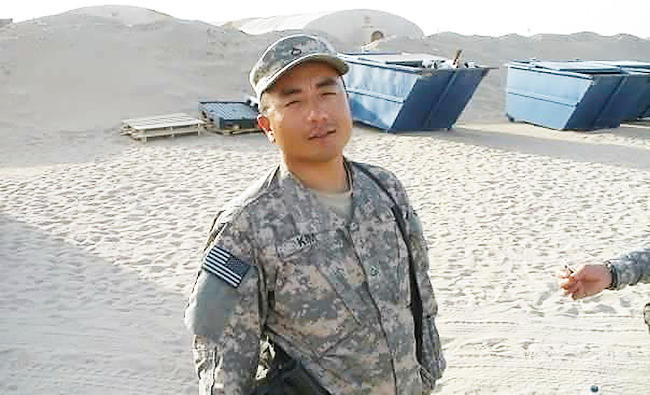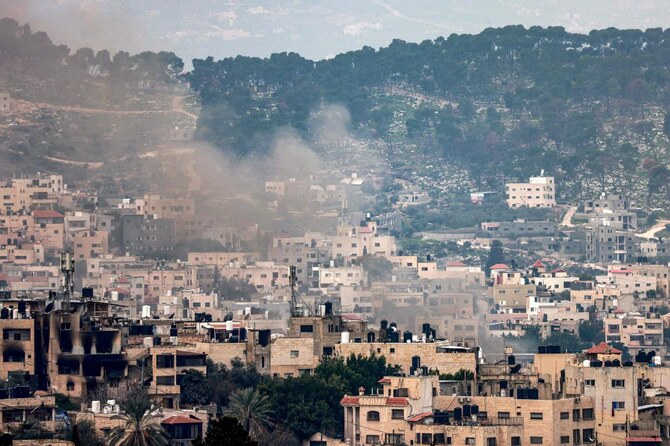SEATTLE: An immigration judge in Washington state declined to release an Iraq War veteran from custody Wednesday while he fights the government’s efforts to deport him.
Chong Kim, a South Korean immigrant and green card holder from Portland, Oregon, struggled with drug addiction, homelessness and post-traumatic stress following his time in Iraq in 2009 and 2010, leading to convictions for burglary and other charges.
Kim’s lawyer and friends have said he has done well since completing a substance abuse treatment program run by the Department of Veterans Affairs early this year.
But immigration agents arrested him in April and brought him to a detention center in Tacoma, Washington. They plan to deport him because of his convictions.
“It’s just wrong to be deporting an Army veteran,” said Matt Luce, 41, of Troutdale, Oregon, who attended high school with Kim and traveled with three other former classmates to the hearing Wednesday. “Despite his convictions, he was on and continues to be on the right path. This is just a travesty of justice.”
Kim’s attorney, Tim Warden-Hertz of the Northwest Immigrant Rights Project, said that Immigration Judge Theresa Scala found that the government met its burden to show that Kim posed a danger to the public or a risk of flight, though he said she did not explain her rationale in court.
Warden-Hertz planned to appeal the decision, which he said illustrates the difficulty of obtaining bond in the immigration detention system.
US Customs and Immigration Enforcement did not immediately respond to an e-mailed request for comment Wednesday.
In an earlier statement, the agency said Kim had been arrested after “it was determined he has a prior felony conviction in Multnomah County for attempt to commit arson in the first degree, among other charges.”
Kim joined the National Guard in 2005 and served in Iraq in 2009 and 2010 before being honorably discharged. He came to the US more than 35 years ago, at age 5, and he became a legal permanent resident in 1981. He does not speak Korean, his friends have said.
His immigration troubles stem primarily from two incidents — a burglary and another case, which his lawyer described as a “dumb prank,” in which he filled a beer bottle with gasoline, lit it on fire and threw it at a concrete outer wall at the back of a hardware store.
After the first matter, in 2013, he faced deportation. The judge let him go — but warned him not to get in trouble again, former Staff Sgt. Ryan Kell, who was Kim’s team leader in Iraq, told the Associated Press in July.
Last year, though, he was convicted of attempted arson in a special veterans court following the second incident. He participated in a 4½-month, inpatient substance abuse treatment program run by the Department of Veterans Affairs, and had been doing well.
“He admits he had a drug problem and that he committed crimes when he was under the influence — he’s not proud of it,” Warden-Hertz said. “To find he’s a danger or a flight risk now doesn’t make any sense.”
In petitioning for Kim’s release pending deportation proceedings, Warden-Hertz submitted letters from a clinical psychologist who detailed Kim’s success in the substance abuse program as well as from a clinical nurse manager at the Portland VA Health Care System, where Kim began working in January as a housekeeper at a cardiology and oncology unit.
“Mr. Kim demonstrated exceptional team work,” the nurse manager, Cynthia Fahy, wrote. “It was regularly reported to this manager that he often went out of his way to assist other housekeepers and nurses.”
Jason Phebus, 31, of Gresham, Oregon, is an Air Force veteran who began drinking heavily — and later using harder drugs — as he had a difficult time transitioning into civilian life. He said Wednesday that he met Chong in the VA’s substance abuse program, and he credited Chong’s friendship and advice with helping him make it to where Phebus is today — in recovery with a steady job.
His response to the notion that Chong might be deported is “a string of explicits,” he said.
“He was man enough to stand up and serve this country, in combat no less,” Phebus said. “Now he’s not fit to be here?“
Judge won’t release Iraq War veteran fighting deportation
Judge won’t release Iraq War veteran fighting deportation

Palestinian presidency accuses Israel of ‘ethnic cleansing’ in West Bank

RAMALLAH: The office of Palestinian president Mahmud Abbas on Monday denounced as “ethnic cleansing” an ongoing Israeli military operation in the occupied West Bank and urged the United States to intervene.
In a statement, spokesman Nabil Abu Rudeineh said the presidency “condemned the occupation authorities’ expansion of their comprehensive war on our Palestinian people in the West Bank to implement their plans aimed at displacing citizens and ethnic cleansing.”
English attorney general involved in guide on combating Israeli apartheid

- Lord Hermer detailed ways Palestinians could sue weapons firms in UK courts
- Handbook, titled ‘Corporate Complicity in Israel’s Occupation,’ was published in 2011
LONDON: The attorney general for England and Wales contributed to a handbook on combating Israeli apartheid during his time as a lawyer working in private practice, the Sunday Telegraph reported.
Lord Hermer wrote a chapter in the book on ways that Palestinian victims could use British courts to sue weapons firms that sold arms to Israel.
Lawyers in the UK were in a “much better position” to take action on the matter than those in the US, he wrote in the book “Corporate Complicity in Israel’s Occupation,” published in 2011.
Lord Hermer, now legal chief to UK Prime Minister Keir Starmer, was working at Doughty Street Chambers as a lawyer at the time.
The book’s introduction says: “It is our hope that this book will prove useful in the fight against Israeli war crimes, occupation and apartheid.” It compiles commentary and contributions from pro-Palestinian lawyers and academics.
In the book, Lord Hermer criticizes British “export licences for weapons used by Israel in violation of international humanitarian and human rights law.”
He provides a list of “proactive steps that the UK could take” to punish firms that sell weapons to Israel that could be used to violate human rights law.
Last year, Lord Hermer played a key role in the UK government’s decision to suspend 30 arms export licenses to Israel.
He also called on the government to abide by the International Criminal Court arrest warrant for Israeli Prime Minister Benjamin Netanyahu.
Lord Hermer’s chapter in the book explains how a Palestinian could use English courts to sue Israeli arms firm Elbit.
“If the company that was producing the drones or the missiles has a factory here, that’s sufficient (to bring legal action),” he said.
In a transcript attached to the chapter, detailing a question-and-answer session, Lord Hermer argued that the British legal system was more favorable to Palestinians than that of the US.
“There’s a much better position here than in the US. In the states, a whole host of important human rights cases have been closed down simply because they touch upon issues of foreign relations,” he said.
Syrian leader to visit Turkiye on Tuesday

ISTANBUL: Syria’s interim president Ahmed Al-Sharaa will visit Turkiye on Tuesday on his second international visit since the toppling of Bashar Assad in December, the Turkish presidency said.
Sharaa “will pay a visit to Ankara on Tuesday at the invitation of our President Recep Tayyip Erdogan,” Fahrettin Altun, head of communications at the presidency, said on X.
Car bomb explosion near Syrian Arab Republic’s Manbij kills 15

DAMASCUS: A car bomb on Monday killed 15 people, mostly women farm workers, in the northern Syrian city of Manbij where Kurdish forces are battling Turkiye-backed groups, state media reported.
Citing White Helmet rescuers, SANA news agency said there had been a “massacre” on a local road, with “the explosion of a car bomb near a vehicle transporting agricultural workers” killing 14 women and one man.
The attack also wounded 15 women, some critically, SANA said, adding the toll could rise.
There was no immediate claim of responsibility.
It was the second such attack in recent days in war-ravaged Syrian Arab Republic, where Islamist-led rebels toppled autocratic president Bashar Assad in December.
The Syrian Observatory for Human Rights war monitor reported nine people, including an unspecified number of pro-Turkiye fighters, killed Saturday “when a car bomb exploded near a military position” in Manbij.
Turkiye-backed forces in Syria’s north launched an offensive against the Kurdish-led, US-backed Syrian Democratic Forces in November, capturing several Kurdish-held enclaves in the north despite US efforts to broker a ceasefire.
With US support, the SDF spearheaded the military campaign that ousted the Daesh group from Syrian Arab Republic in 2019.
But Turkiye accuses the main component of the group – the People’s Protection Units (YPG) – of being affiliated with the militant Kurdistan Workers’ Party (PKK).
Both Turkiye and the United States have designated the PKK, which has waged a decades-long insurgency on Turkish soil, a terrorist group.
Syrian Arab Republic’s new rulers have called on the SDF to hand over their weapons, rejecting demands for any kind of Kurdish self-rule.
Assad ruled Syrian Arab Republic with an iron fist and his bloody crackdown down on anti-government protests in 2011 sparked a war that killed more than 500,000 people and displaced millions.
Israeli prime minister in Washington for Gaza ceasefire talks

- Netanyahu told reporters he would discuss "victory over Hamas"
- Trump said Sunday that negotiations with Israel and other countries in the Middle East were "progressing"
JERUSALEM: Israeli Prime Minister Benjamin Netanyahu is expected to begin talks Monday on brokering a second phase of the ceasefire with Hamas, his office said, as he visits the new Trump administration in Washington.
Ahead of his departure, Netanyahu told reporters he would discuss "victory over Hamas", contending with Iran and freeing all hostages when he meets with President Donald Trump on Tuesday.
It will be Trump's first meeting with a foreign leader since returning to the White House in January, a prioritisation Netanyahu called "telling".
"I think it's a testimony to the strength of the Israeli-American alliance," he said before boarding his flight.
He was welcomed to the US capital on Sunday night by Israel's ambassador to the UN Danny Danon, who stressed the coming Trump-Netanyahu meeting would strengthen "the deep alliance between Israel and the United States and will enhance our cooperation".
Trump, who has claimed credit for sealing the ceasefire deal after 15 months of war, said Sunday that negotiations with Israel and other countries in the Middle East were "progressing".
"Bibi (Benjamin) Netanyahu's coming on Tuesday, and I think we have some very big meetings scheduled," Trump said.
Netanyahu's office said he would begin discussions with Trump's Middle East envoy Steve Witkoff on Monday over terms for the second phase of the truce.
Indirect negotiations between Israel and Hamas are meanwhile due to resume this week.
The initial, 42-day phase of the deal is due to end next month.
The next stage is expected to cover the release of the remaining captives and to include discussions on a more permanent end to the war.
Trump has said that 15 months of fighting has reduced the Palestinian territory to a "demolition site" and has repeatedly touted a plan to "clean out" the Gaza Strip, calling for Palestinians to move to neighbouring countries such as Egypt or Jordan.
Qatar, which jointly mediated the ceasefire along with the US and Egypt, underscored on Sunday the importance of allowing Palestinians to "return to their homes and land".
"We emphasised the importance of concerted efforts to intensify the entry of humanitarian aid and rehabilitate the Strip to make it livable and to stabilise the Palestinian people in their land," Qatari Prime Minister Mohammed bin Abdulrahman bin Jassim Al Thani said following a meeting with Turkey's foreign minister.
Under the ceasefire's first phase, Hamas was to free 33 hostages in staggered releases in exchange for around 1,900 Palestinians held in Israeli jails.
The truce has also led to a surge of food, fuel, medical and other aid into rubble-strewn Gaza, while displaced Palestinians have been allowed to begin returning to the north.
During their October 7, 2023 attack, Hamas militants took 251 hostages, 91 of whom remain in Gaza, including 34 the Israeli military has confirmed are dead.
The attack resulted in the deaths of 1,210 people, mostly civilians, according to an AFP tally based on official Israeli figures.
Israel's retaliatory response has killed at least 47,283 people in Gaza, a majority civilians, according to the Hamas-run territory's health ministry, figures which the UN considers reliable.
While Trump's predecessor Joe Biden sustained Washington's military and diplomatic backing of Israel, it also distanced itself from the mounting death toll and aid restrictions.
Trump moved quickly to reset relations.
In one of his first acts back in office, he lifted sanctions on Israeli settlers accused of violence against Palestinians and reportedly approved a shipment of 2,000-pound bombs that the Biden administration had blocked.
The ceasefire discussions in Washington are expected to also cover concessions Netanyahu must accept to revive normalisation efforts with Saudi Arabia.
Riyadh froze discussions early in the Gaza war and hardened its stance, insisting on a resolution to the Palestinian issue before making any deal.
Trump believes "that he must stabilise the region first and create an anti-Iran coalition with his strategic partners," including Israel and Saudi Arabia, said David Khalfa, a researcher at the Jean Jaures Foundation in Paris.
But Netanyahu faces intense pressure from within his cabinet to resume the war, with Finance Minister Bezalel Smotrich threatening to quit and strip the prime minister of his majority.
On the ground, Israel said Sunday it has killed at least 50 militants and detained more than 100 "wanted individuals" during an operation in the West Bank.
The massive offensive began on January 21 with the Israeli military saying it aimed to root out Palestinian armed groups from the Jenin area, which has long been a hotbed of militancy.
On Sunday, Palestinian official news agency WAFA said Israeli forces "simultaneously detonated about 20 buildings" in the eastern part of Jenin refugee camp, adding that the "explosions were heard throughout Jenin city and parts of the neighbouring towns".
The Palestinian health ministry meanwhile said the Israeli military killed a 73-year-old man and a 27-year-old in separate incidents in the West Bank on Sunday.
Violence has surged across the West Bank since the Gaza war broke out in October 2023.
Israeli troops or settlers have killed at least 883 Palestinians in the West Bank since the start of the war, according to the Palestinian health ministry.
At least 30 Israelis have been killed in Palestinian attacks or during Israeli military raids in the territory over the same period, according to Israeli official figures.
















